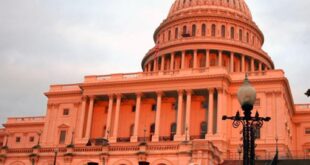CAIRO (AFP) — Eighty-three per cent of voters backed a law change allowing for Egypt’s first competitive presidential election, the government said Thursday, as the United States blasted police violence at pro-reform rallies.
Interior Minister Habib Adli hailed the 53 per cent of the country’s 32.5 million voters who cast their ballots Wednesday as having “expressed themselves freely and displayed their patriotism.”
He said it was “the highest turnout ever registered in a referendum.”
Egypt’s President Hosni Mubarak, 77, won his four previous six-year terms by popular referendums after being approved as the sole candidate by a legislature dominated by his ruling National Democratic Party.
He had called on his fellow-citizens to “actively participate” in televised address on the eve of Wednesday’s key vote.
“This is a message to all those that thought they had a monopoly on the truth and a message for the world,” Adli also said, in a veiled message to the opposition.
“The silent majority has broken its silence and decided to positively participate (in the vote) to help build the democratic society we deserve,” said public television anchor Abdellatif Minawi.
Analysts had said that the key test would be turnout rather than the number of votes cast in favour of the amendment.
The opposition, behind a wave of unprecedented protests against Mubarak in recent weeks, decried the referendum they had called on their followers to boycott as an “electoral farce” and complained of intimidation by authorities.
US President George W. Bush condemned attacks by Egyptian police on demonstrators during anti-referendum rallies.
“The idea of people expressing themselves and opposition of the government and getting a beating is not our view of how a democracy ought to work. It’s not the way that you have a free election.
“People ought to be allowed to express themselves and I’m hopeful that the president will have open elections, that everybody can have trust in,” Bush said in a joint press conference with visiting Palestinian leader Mahmoud Abbas.
Voting day turned violent when police used clubs to break up a group of opposition demonstrators in Cairo and cracked down on other rallies held across the country in protest at the reform, arresting a number of activists.
And an Egyptian journalist accused supporters of Mubarak’s National Democratic Party (NDP) of sexually harassing her, ripping her clothes and stealing her money and jewels in front of the journalists’ union in downtown Cairo.
The umbrella pro-reform organisation Kefaya (Enough) charged that NDP activists had molested women colleagues and thrashed several marchers with police complicity.
“They unleashed thugs, pickpockets and criminals that were waiving posters of the president in one hand and sticks, knifes and stones in the other,” the group also said in a statement Thursday.
Kefaya said that “the NDP’s mercenaries” sought to “terrorise free citizens who have ‘Enough’ of the corruption, baseness and rottenness of the 24 last years,” since Mubarak took office.
And one of the group’s co-founders, Mohammed Sayyed, charged that Egypt’s Prime Minister Ahmed Nazif, recently on an official visit to the White House, had “received the US green light to crackdown on the movement that demands democracy and made sure that Washington would keep silent.”
The secular and Islamist opposition charges that the constitutional amendment which will take effect in the September’s presidential election severely restricts independent candidates and overwhelmingly favours Mubarak’s ruling party.
Under the proposed changes, independent candidates for September’s election must collect 250 signatures from members of national and provincial assemblies that are dominated by Mubarak’s party.
For the following election in 2011, the rules will also require parties fielding candidates to hold a minimum of five per cent of seats in both houses of parliament.
Mubarak has said he would announce whether he will run for a fifth term after the referendum.
Many voters questioned by AFP on Wednesday said they thought they were being asked to reelect Mubarak for a fifth six-year term, not vote on a constitutional amendment.
 Eurasia Press & News
Eurasia Press & News



